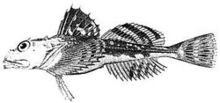Longhorn sculpin
| Longhorn sculpin | |
|---|---|

| |
| Scientific classification | |
| Kingdom: | Animalia |
| Phylum: | Chordata |
| Class: | Actinopterygii |
| Order: | Scorpaeniformes |
| Family: | Cottidae |
| Genus: | Myoxocephalus |
| Species: | M. octodecemspinosus
|
| Binomial name | |
| Myoxocephalus octodecemspinosus | |
| Synonyms | |
|
Cottus octodecemspinosus | |
The longhorn sculpin (Myoxocephalus octodecemspinosus) is a Northwest Atlantic species of sculpin in the fish family Cottidae.[2][3] It is a predatory and scavenging fish that can feed on the remains of other organisms.[4]
Appearance[]
The longhorn sculpin varies in color with its surroundings. It has four tinted bands on the back of its body, which range from dark brown to tinted yellow and dark olive in color. When the fish is resting on sand or dirt, it is plain in color, but when resting on pebbles, it is variably marked in order to blend in with its surroundings in both scenarios. The dorsal spines and head spines on the fish are very sharp, and one must be careful if they are to handle it. It has two variably marked dorsal fins, along with two pectorals and an anal fin.[5][6]
Occurrence[]
The range extends from Newfoundland and the Gulf of Saint Lawrence to Virginia.[2][3] It is a demersal species that lives in shallow coastal waters, moving to deeper water in winter.[2] It is commonly found at depths of 50 fathoms deep, but can be found as deep as 105 fathoms.[5][6]
References[]
- ^ "Myoxocephalus octodecemspinosus (Mitchill, 1814)". ITIS. Retrieved 28 April 2014.
- ^ a b c Froese, Rainer; Pauly, Daniel (eds.) (2014). "Myoxocephalus octodecemspinosus" in FishBase. April 2014 version.
- ^ a b "Myoxocephalus octodecemspinosus (Mitchill, 1814)". GBIF.ORG. Retrieved April 28, 2014.
- ^ Link, Jason S.; Almelda, Frank P. (18 September 2001). "Opportunistic feeding of longhorn sculpin (Myoxocephalus octodecemspinosus): Are scallop fishery discards an important food subsidy for scavengers on Georges Bank?" (PDF). Fishery Bulletin. NOAA. 100 (2): 381–385. Retrieved 28 April 2014.
- ^ a b Warfel and Merriman (Copeia, 1944, p. 198)
- ^ a b Cox, Contrib. Canadian Biol. (1918-1920) 1921, p. 111; Leim, Proc. Nova Scotian Inst. Sci., vol. 20, 1940, p. 40.
External links[]
- Myoxocephalus
- Fish of the Atlantic Ocean
- Fish described in 1814
- Taxa named by Samuel L. Mitchill
- Scorpaeniformes stubs